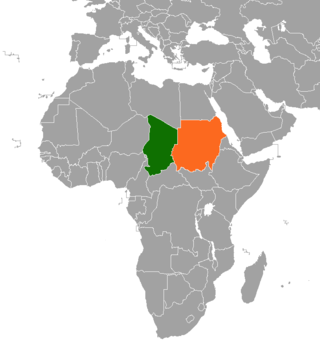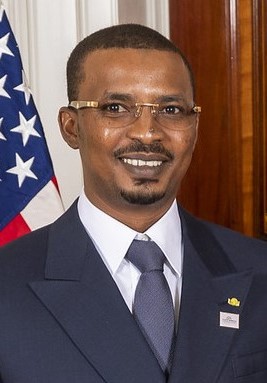| |||||
| Decades: | |||||
|---|---|---|---|---|---|
| See also: | |||||
The following lists events that happened during 1991 in Chad .
| |||||
| Decades: | |||||
|---|---|---|---|---|---|
| See also: | |||||
The following lists events that happened during 1991 in Chad .
The Transitional National Charter was approved by the MPS. The Charter consists of a preamble, eight chapters and 51 articles in which the total dismantling of the Habré regime of terror is announced, as well as the creation of a 30-month military Interim Government led by Idriss Déby and the promise of a referendum for the establishment of a new civil constitution once this period has expired. [1]
FROLINAT-Fondamental, a more conservative split from FROLINAT formed in 1978, announces its dissolution and joining the MPS. [2]
The Mouvement National des Rénovateurs Tchadiens (MNRT), a Libyan-based opposition group led by Ali Muhammad Diallo, accused the Interim Government of being anti-democratic and demanded an immediate referendum. [3]
The MPS held an extraordinary congress. During the congress, voices were raised denouncing the accumulation of functions of the regime's number two, Bada Abbas Maldoum, who was both Minister of the Interior and vice president of the MPS. At the end of the congress, the position of Vice President of the MPS was abolished. This elimination was negatively received by the Hadjaraï clan and by Maldoum himself. [4]
The Council of Ministers signed an order that establishes the conditions for the creation of political parties in Chad, emphasizing above all that all political parties to be established must first renounce tribalism, regionalism and religious sectarianism. [5]
Authorities dismantle an alleged coup after rebel soldiers attacked an arsenal near N'Djamena Airport. Déby accuses the still Interior Minister Maldoum of being behind the plot, who will be assassinated along with several supporters. Observers interpreted the coup as a rebellion against the dominance of Deby's Zaghawa ethnic group, but others believe the plot was a false flag to purge Maldoum and isolate the Hadjaraï from power. After these events, Kafine Chadallah, close to Maldoum, will announce rebellion and begin an armed struggle against Déby. [4]
Chad, officially the Republic of Chad, is a landlocked country in Central Africa. It borders Libya to the north, Sudan to the east, the Central African Republic to the south, Cameroon and Nigeria to the southwest, and Niger to the west. Due to its distance from the sea and its largely desert climate, the country is sometimes referred to as the "Dead Heart of Africa".

Idriss Déby Itno was a Chadian politician and military officer who was the 6th president of Chad from 1991 until his death in 2021 during the Northern Chad offensive. His term of office of more than 30 years makes him Chad's longest-serving president.
Goukouni Oueddei is a Chadian politician who served as President of Chad from 1979 to 1982.

FROLINAT was an insurgent rebel group active in Chad between 1966 and 1993.
Wadel Abdelkader Kamougué was a Chadian politician and army officer. Kamougué was a leading figure in the 1975 coup d'état and subsequently held several positions in the Chadian government and legislature. He was Vice President of Chad from 1979 to 1982 and President of the National Assembly from 1997 to 2002. Kamougué was also President of the Union for Renewal and Democracy (URD) political party, and he was appointed as Minister of National Defense in April 2008.
Jean Alingué Bawoyeu, known in French as the vieux sage, which translates as "wise elder", is a Chadian politician who was Prime Minister of Chad from 1991 to 1992. During the 1970s, he served successively as Ambassador to the United States and France. Later, he was President of the National Assembly in 1990. He served in the government as Minister of Justice from 2008 to 2010 and as Minister of Posts and New Information Technologies from 2010 to 2013.

Presidential elections were held in Chad on 3 May 2006. A referendum in 2005 had led to changes to the constitution that made it possible for President Idriss Déby to run for a third term; having come to power in December 1990, he had previously won elections in 1996 and 2001. Despite a serious rebellion based in the east of the country, the elections were held on schedule; Déby was re-elected with about 65% of the vote, according to official results. The main opposition parties boycotted the election.
Ibni Oumar Mahamat Saleh is a Chadian politician and opposition leader who headed the Party for Liberties and Development (PLD).
Abbas Koty Yacoub was a Chadian political figure and rebel leader.

The Constitution of the Republic of Chad is the supreme law of Chad. Chad's seventh constitution, it was adopted in 1996, six years after President Idriss Déby rose to power following a successful rebellion against President Hissène Habré, this formal document establishes the framework of the Chadian state and government and enumerates the rights and freedoms of its citizens. In its current form, the contents of the Constitution include a preamble, 16 parts and 225 articles.
General Mahamat Nouri is a Chadian insurgent leader who currently commands the Union of Forces for Democracy and Development (UFDD). A Muslim from northern Chad, he began his career as a FROLINAT rebel, and when the group's Second Army split in 1976 he sided with his kinsman Hissène Habré. As Habré's associate he obtained in 1978 the first of the many ministerial positions in his career, becoming Interior Minister in a coalition government. When Habré reached the presidency in 1982, Nouri was by his side and played an important role in the regime.

The populations of eastern Chad and western Sudan established social and religious ties long before either nation's independence, and these remained strong despite disputes between governments. In recent times, relations have been strained due to the conflict in Darfur and a civil war in Chad, which both governments accuse the other of supporting.
The National Union for Independence and Revolution was the ruling party in Chad between 1984 and 1990. It was founded in June 1984 by President Hissène Habré as a successor of his Armed Forces of the North, the insurgent group through which Habré had conquered power in 1982. The party was banned six years later by Idriss Déby when he assumed power by overthrowing Habré in the 1990 coup d'état.

Mahamat Idriss Déby Itno is a Chadian politician and military officer who has been the leader of Chad since 2021, first as President of the Transitional Military Council from 2021 to 2022, then as Transitional President from 2022 to 2024, and then as the 7th President since 2024 following his victory in the presidential elections. He is widely known in Chad by his nickname Kaka. He is also the General Secretary of the Patriotic Salvation Movement since 2022. He gained power on 20 April 2021, succeeding his father and predecessor, Idriss Déby, who died in action while commanding troops in the Northern Chad offensive. He previously served as the second in-command of the military for the Chadian Intervention in Northern Mali (FATIM).

The 1990 Chadian coup d'état took place on 3 December 1990 when the forces of the Patriotic Salvation Movement (MPS), a Libyan–backed rebel group under the leadership of General Idriss Déby, entered the Chadian capital N'Djamena unopposed. The MPS troops entered Chad by crossing the Sudanese border three weeks earlier.

The Transitional Military Council was a military junta that ruled Chad from 2021 to 2022. It announced the death of former President Idriss Déby on 20 April 2021, and declared that it would take charge of the government of Chad and continue hostilities against FACT rebels in the north of the country. It was chaired by Mahamat Idriss Déby, the son of the late President, making him the de facto President of Chad. It was dissolved on 10 October 2022, following a "national dialogue" that named Déby Transitional President and replaced the CMT with a transitional administration appointed by him.

Succès Masra is a Chadian economist and politician who served as the Prime Minister of Chad from 1 January to 22 May 2024. Having formerly worked for the African Development Bank, in 2018 he founded Les Transformateurs, a political party that became part of the opposition against former president Idriss Déby, and following Déby's death in 2021, the Transitional Military Council.
The following lists events that happened during 1992 in Chad.